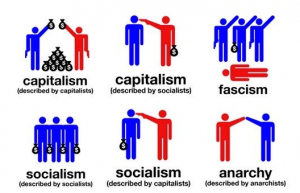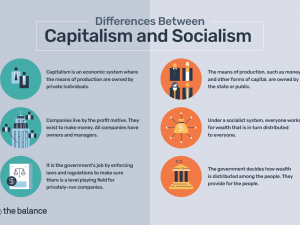Margaret L. Andersen and Howard F. Taylor stated in their Sociology: Understand a Diverse Society “…October 8, 2001, the four hundred richest Americans have a total net worth that exceeds the gross domestic product of the entire nation of China. The wealthiest 1 percent own 38 percent of l net worth; the bottom 80 percent control only 17 percent”. (Anderson 227) And “the concentration of wealth is higher in America than any of the other industrialized nations.” (Anderson 227) In contrast to the vast amount of wealth and income by elites, a very large proportion of Americans have hardly any financials assets once debt is subtracted. A question can be raised: what leads a country to this situation? How can a small group gain that much of wealth? The answer can be mainly seen in Mark’s work. He believed that right Capitalism, an economic system based on the pursuit of profit and the sanctity of private property causes the problem, and he used a class analysis to explain capitalism, but in this paper I am not going to explore complicated aspects of capitalism, but focus on how capitalist countries have influenced life of the rest of the world in this modern time.
 The ultimate goal of tycoons is to gain privately as much as they can, so they would do no business if goods were exchanged at the cost to produce them. They want to sell commodities for more than they actual value- more than the cost of production, including materials and labor. In addition, in order to get more and more money they need to keep expanding their business, both domestically and internationally. So making every effort to seek sources of cheap labor, cheap materials and consumer markets is something unchanged in terms of nature of capitalists. The only change is the form they have done to reach the goal throughout the different periods of the history.
The ultimate goal of tycoons is to gain privately as much as they can, so they would do no business if goods were exchanged at the cost to produce them. They want to sell commodities for more than they actual value- more than the cost of production, including materials and labor. In addition, in order to get more and more money they need to keep expanding their business, both domestically and internationally. So making every effort to seek sources of cheap labor, cheap materials and consumer markets is something unchanged in terms of nature of capitalists. The only change is the form they have done to reach the goal throughout the different periods of the history.
Capitalism was born at the same time of industrialism which led to great need of raw materials and labor for mass production. How to get cheap materials and cheap labor? As we know where there is money, there is power. The capitalists, with their power of money, act like puppeteers, controlling, driving governments to act in the way beneficial to their interest; that is why colonialism, imperialism and their variants, in succession, came to exist. During the time of colonialism, poor and technologically backward countries became lucrative areas to capitalists who used their money to urge their governments to conduct deadly wars to get sources of supply for their factories. Colonization came to and end soon after the Second World War, largely because it became too expensive to maintain large armies and administration staffs in distant countries. As a result, the powerful countries have turned to other ways to control the poor countries. One of them is so-called neocolonialism, a “form of international control of the poor countries by the rich countries, but without direct political or military involvement.” (Anderson 253) “They set prices very low for raw material produced by the poor countries to prevent them from accumulating enough profit to industrialize.” (Anderson 253) As a result, the poor countries must borrow from the rich countries and debt creates only dependence. Many poor countries are so deeply in debt to the major industrial countries that they must follow the economic edicts if the rich countries that loaned them the money. Multinational corporations are also play a key role in maintaining neocolonialism. Multinationals buy resources where they can get the cheapest price, manufacture their products where production and labor cost the lowest, and sell their products where they can make the largest profits. From one point of view, multinationals are only following good business practices. Unfortunately this usually works to the detriment of the poor countries and to the advantage of the rich countries. Cheap resources and low-wage labor are found in poor countries, yet the profit ends up in the rich countries. Not coincidentally, the ability of multinationals to operate in other countries also gives them access to-and often controls over-critical raw materials. These resources needed in aerospace-defense industries are often inaccessible or expensive in their countries. Therefore, it is in both the economic and the military interests of the state to secure the safety of these corporations that procure these materials in other countries and enable them to continue operations in time of political unrest. The global expansion of capital accumulation interests has been aided, by congressional willingness to provide tax dollars for military expenditures and by the foreign policy devised by civilian national security managers. These managers, typically drawn from business and finance circles, formulate foreign policy that is consistent with the need to protect corporations’ foreign operations. We can take the Gulf War to see the great influence of capitalist corporations on the world. The American intervention after Iraq’s invasion of Kuwait was based on the need to maintain U.S. access to its vast oil reserves. Yet the U.S. national security managers had previously notified Iraq’s Saddam Hussein that Iraq could settle its dispute with Kuwait in any manner that it saw fit. Why, then the U.S Congress did approval, go to the war against Iraq?
In the aftermath of the war, it became clear that the big winners were the components of the military-industrial complex. In the book Sociology: Diversity, Conflict and Change, Kenneth J. Neubeck and Davita Silfen Glasberg stated that “The profits of oil corporations increased by an amazing 75% in the first week of the war (Hayes, 1991).” (343) other big winners included the military, which was facing vast budget cuts at the end of the Cold War. Moreover, a similar case could be made for the need to protect the world against weapons of mass destruction produced by North Korea, One difference between these two countries is that Iraq controls huge oil supplies needed by the U.S and the industrialized nations in which it’s multinationals have investment, and North Korea does not. “Notice that Halliburton Corporation has alone been awarded the highly lucrative contract to rebuild Iraq in the aftermath of the war. And remember its substantial connections to the George W. Bush administration.” (Kenneth J. Neubeck 344).
 Two main economic systems have been developed since the Industrial Revolution, these are Capitalism and Socialism. Both systems have advantages and disadvantages, this essay will explain these, and also give my proposals for a mixed system for the whole society of the United Kingdom. Capitalism generally started as an economic system in the United Kingdom at the time of the Industrial Revolution. The basic explanation of Capitalism would be to say that ‘the economy is left to its own devices with no Government intervention’. A Capitalist economy is a market economy where all economic decision making is decentralized, and the Government will only supply national defense, administer justice and provide certain public works. The goods that are provided in a Capitalist economy are decided by individuals who choose how to use their labor and spend their income. All resources are privately owned and will only be used for obtaining the highest profit. Advantages of Capitalism There are many advantages to a Capitalist economic system which could make it very appealing to society. The system allows the powers of market forces to operate which in turn gives the consumer a wider range of goods and services. Also because producers are always seeking the highest profit they must try to please the consumer and win their custom. This leads to innovation and greater quality and variety. The firms which produce the correct goods and services will win custom and make profit, those which don’t will go out of business and therefore release their resources to the successful firms. This will lead to the expansion of the economy and greater prosperity. In summing up the advantages, it is clear to see that the consumer has the power to dictate the goods in the economy.
Two main economic systems have been developed since the Industrial Revolution, these are Capitalism and Socialism. Both systems have advantages and disadvantages, this essay will explain these, and also give my proposals for a mixed system for the whole society of the United Kingdom. Capitalism generally started as an economic system in the United Kingdom at the time of the Industrial Revolution. The basic explanation of Capitalism would be to say that ‘the economy is left to its own devices with no Government intervention’. A Capitalist economy is a market economy where all economic decision making is decentralized, and the Government will only supply national defense, administer justice and provide certain public works. The goods that are provided in a Capitalist economy are decided by individuals who choose how to use their labor and spend their income. All resources are privately owned and will only be used for obtaining the highest profit. Advantages of Capitalism There are many advantages to a Capitalist economic system which could make it very appealing to society. The system allows the powers of market forces to operate which in turn gives the consumer a wider range of goods and services. Also because producers are always seeking the highest profit they must try to please the consumer and win their custom. This leads to innovation and greater quality and variety. The firms which produce the correct goods and services will win custom and make profit, those which don’t will go out of business and therefore release their resources to the successful firms. This will lead to the expansion of the economy and greater prosperity. In summing up the advantages, it is clear to see that the consumer has the power to dictate the goods in the economy.  As discussed in the advantages of Capitalism the consumer has all the power in the economy. However individual’s purchasing power is drastically unequal because of the inequality of wealth within the economy. This is due to the fact that some people will always be able to work harder, be more innovative and be more talented than others, and therefore be more profitable and promote themselves higher in the economy whilst others will fail. Because of the inequality of wealth in a truly Capitalist society with no Government welfare great poverty will occur. This will lead to homelessness, slums, disease, etc. Forced migration will also increase these problems in large cities and towns. The people who cannot make any money in the countryside will move to the towns and cities with the belief of finding work and making money. In reality they will just add to the ever growing population of the poor classes. In a Capitalist society the rich get richer and the poor stay poor. In the end this will lead to great unrest and low morale in the society. Socialism or Communism is the result of a planned economy. In this type of economy all the resources are owned by the state and wealth is divided equally. The state will plan what is needed to be produced to cope with the societies demands, and how to distribute goods. Socialism emerged in response to the great inequality produced through Capitalism during the 1800s, and there were three main theories which people believed would solve the Capitalist society’s problems, they were: Democratic Socialism – Socialism through peaceful reform. Revolutionary Socialism – Revolting against the existing system to achieve Socialism. This theory was put forward by Karl Marx who said that the proletariat will take control of the factories. This means the down trodden working class in the Capitalist society will revolt against their employers and form a Communist state, where people will work for each other to provide equality. Anarchists – This theory involves rejecting Government authority and living in small groups or communes with no Government influence. In 1917 the first major Socialist revolution occurred, this was in Russia and led to the birth of the Soviet Union. Since then Socialism has spread to other countries, such as China and Cuba and in 1988 included about one third of the world’s population. However the Soviet Union has collapsed and split into independent states, which are all trying to move to a more capitalist society, but other countries are still Socialist. In Socialism, Theoretically wealth is distributed equally in a Socialist society and jobs are provided for everyone, even though some are not productive. This provides personal security. Also because the economy is planned the amount of goods and services which are needed are forecast in advance, this should meet necessary demand. As disadvantages of Socialism, we can see Socialism is a very idealistic theory and, as proved in many examples, such as the Soviet Union, doesn’t always follow all the rules of pure Socialism and therefore creates many disadvantages. For a start wealth isn’t always distributed equally, the rulers of the state will live in luxury while others will not. The economy will also suffer from excessive amounts of bureaucracy and will be slow and cumbersome.
As discussed in the advantages of Capitalism the consumer has all the power in the economy. However individual’s purchasing power is drastically unequal because of the inequality of wealth within the economy. This is due to the fact that some people will always be able to work harder, be more innovative and be more talented than others, and therefore be more profitable and promote themselves higher in the economy whilst others will fail. Because of the inequality of wealth in a truly Capitalist society with no Government welfare great poverty will occur. This will lead to homelessness, slums, disease, etc. Forced migration will also increase these problems in large cities and towns. The people who cannot make any money in the countryside will move to the towns and cities with the belief of finding work and making money. In reality they will just add to the ever growing population of the poor classes. In a Capitalist society the rich get richer and the poor stay poor. In the end this will lead to great unrest and low morale in the society. Socialism or Communism is the result of a planned economy. In this type of economy all the resources are owned by the state and wealth is divided equally. The state will plan what is needed to be produced to cope with the societies demands, and how to distribute goods. Socialism emerged in response to the great inequality produced through Capitalism during the 1800s, and there were three main theories which people believed would solve the Capitalist society’s problems, they were: Democratic Socialism – Socialism through peaceful reform. Revolutionary Socialism – Revolting against the existing system to achieve Socialism. This theory was put forward by Karl Marx who said that the proletariat will take control of the factories. This means the down trodden working class in the Capitalist society will revolt against their employers and form a Communist state, where people will work for each other to provide equality. Anarchists – This theory involves rejecting Government authority and living in small groups or communes with no Government influence. In 1917 the first major Socialist revolution occurred, this was in Russia and led to the birth of the Soviet Union. Since then Socialism has spread to other countries, such as China and Cuba and in 1988 included about one third of the world’s population. However the Soviet Union has collapsed and split into independent states, which are all trying to move to a more capitalist society, but other countries are still Socialist. In Socialism, Theoretically wealth is distributed equally in a Socialist society and jobs are provided for everyone, even though some are not productive. This provides personal security. Also because the economy is planned the amount of goods and services which are needed are forecast in advance, this should meet necessary demand. As disadvantages of Socialism, we can see Socialism is a very idealistic theory and, as proved in many examples, such as the Soviet Union, doesn’t always follow all the rules of pure Socialism and therefore creates many disadvantages. For a start wealth isn’t always distributed equally, the rulers of the state will live in luxury while others will not. The economy will also suffer from excessive amounts of bureaucracy and will be slow and cumbersome.  Also there will be a lack of innovation, and goods will be of a poor standard because effort will not be rewarded. A doctor could earn the same as a street cleaner, this wouldn’t make seven years at medical school a very appealing option Socialism oppresses many aspects of human nature which, however good or bad, make us the individuals that we are, these aspects could include; ambition, greed and generosity. A Mixed System for Society For both Capitalism and Socialism the disadvantages far outweigh the advantages but they are the basis of most economic systems in the world. In the United Kingdom both theories have been used, Capitalism was about at the time of the Industrial Revolution as explained earlier, and aspects of Socialism could be seen at the time of the Second World War. At this time all people worked for the state in one way or another, whether it was fighting at the front-line or working in a factory to produce arms. Goods and services could be seen to be distributed fairly; this was done using ration books. This form of socialism was successful because everyone believed in the same cause, and that was winning the war. Since the war the Government has still kept a lot of control but the opportunity for entrepreneurship is available. The economy in the United Kingdom is, as far as I can see, the only way a society can flourish. The Government tax people but provide health care, infrastructure, education and welfare as well as owning certain industries to keep some form of economic planning available to them. However recently the Government has sold off a lot of nationalized industries and this has allowed for more competition and moves the economy in to a more Capitalist state. A Capitalist society there is great suffering because of the great inequality but in a Socialist society it seems that, even though the idea of everyone living equally in harmony is appealing, the fact of the matter is that the only equality that people will share is the equality of no choice and oppression. True Socialism can never work in any society because it is human nature to want mare than you have and to strive to achieve this. Countries that say they are socialist seem to me to be more of a dictatorship. A true mix between the two must be achieved to sustain a healthy economy and a happy society.
Also there will be a lack of innovation, and goods will be of a poor standard because effort will not be rewarded. A doctor could earn the same as a street cleaner, this wouldn’t make seven years at medical school a very appealing option Socialism oppresses many aspects of human nature which, however good or bad, make us the individuals that we are, these aspects could include; ambition, greed and generosity. A Mixed System for Society For both Capitalism and Socialism the disadvantages far outweigh the advantages but they are the basis of most economic systems in the world. In the United Kingdom both theories have been used, Capitalism was about at the time of the Industrial Revolution as explained earlier, and aspects of Socialism could be seen at the time of the Second World War. At this time all people worked for the state in one way or another, whether it was fighting at the front-line or working in a factory to produce arms. Goods and services could be seen to be distributed fairly; this was done using ration books. This form of socialism was successful because everyone believed in the same cause, and that was winning the war. Since the war the Government has still kept a lot of control but the opportunity for entrepreneurship is available. The economy in the United Kingdom is, as far as I can see, the only way a society can flourish. The Government tax people but provide health care, infrastructure, education and welfare as well as owning certain industries to keep some form of economic planning available to them. However recently the Government has sold off a lot of nationalized industries and this has allowed for more competition and moves the economy in to a more Capitalist state. A Capitalist society there is great suffering because of the great inequality but in a Socialist society it seems that, even though the idea of everyone living equally in harmony is appealing, the fact of the matter is that the only equality that people will share is the equality of no choice and oppression. True Socialism can never work in any society because it is human nature to want mare than you have and to strive to achieve this. Countries that say they are socialist seem to me to be more of a dictatorship. A true mix between the two must be achieved to sustain a healthy economy and a happy society.
Every matter has two sides, many people criticize capitalism because of its negative effects; however, capitalism is not always wrong. The involvement of multinationals does not always bring poverty. Some nations in which they have built factories to exploit cheap labor have eventually developed by educating their workforce, making a lot of skilled workforce. Two countries with greatest post war economic are Singapore and Hong Kong. Both were British colonies, yet they have had successful economic development because of their dependence on Britain. It is not always the case that capitalism leads to exploitation and economic backwardness.
 Author:
Author:
Dr. Fakhrul Islam Babu
Executive Director
China Bangladesh Friendship Center Limited-CBFCL
